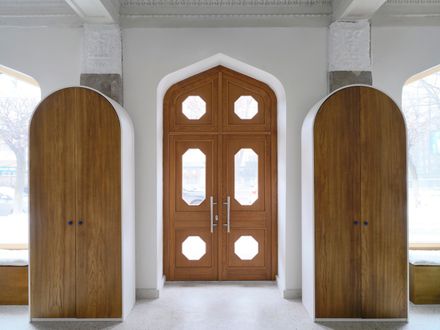ARCHITECTS
Naaw
LEAD ARCHITECTS
Elvira Bakubayeva, Victoria Akram
RECYCLED PLASTIC TABLES
Rocket Plastic
BRANDING DESIGN
Dunie, Domingo Salone
PROJECT MANAGEMENT
Akmaral Mendygarina
GENERAL SUPERVISION
Aisulu Uali
ASSISTANCE
Niknaz Tillavaldyyeva
ART
Nurbol Nurakhmet, Assel Nussipkozhanova
MANUFACTURERS
&tradition, Aq Objects, Hay, Normann Copenhagen
TEXTILES
The Yourta, Dunie
AREA
250 M²
YEAR
2024
LOCATION
Almaty, Kazakhstan
CATEGORY
Adaptive Reuse, Renovation, Coffee Shop Interiors
Introducing our recent project, FIKA, located within the historic TurkSib Railway Workers' House in Almaty, Kazakhstan.
The TurkSib Railway Workers' House stands as a significant remnant of the Soviet era, embodying the region's industrial and architectural heritage.
Our goal with FIKA was not only to create a distinctive urban space but also to engage in a meaningful dialogue with the building's rich historical layers.
During the demolition phase, we uncovered original plasterwork, including intricate ceiling moldings and capitals, concealed beneath suspended ceiling panels.
Recognizing their historical significance, we deliberately preserved and prominently showcased these elements in the design.
This choice serves as a poignant metaphor for deconstructing the past, as the preserved "excessive" decorative moldings from the Soviet-national style of 1953 now coexist harmoniously with the "ascetic" structural concrete, symbolizing the nuanced interplay between historical preservation and modernity evident throughout FIKA.
To better integrate FIKA with its surroundings and capture the essence of the city, we replaced the previous plastic angular windows with wooden metal ones.
This change not only increased natural light within the space but also provided guests with views of the urban environment, blurring the boundaries between the interior and the city and creating a sense of continuity and engagement.
FIKA is divided into several zones based on function and seating type, maintaining an open and fluid space. The centrally located entrance features a display case with baked goods.
To the left, guests find a bar with small coffee seating, an open bakery, armchairs, and several large tables.
On the right, a communal table provides space for interactions among townspeople, while bench seating along the wall, a large art piece, and wine shelves create an ideal setting for evening dinners with wine.
Towards the back of the room, a quieter area with monolithic sofas emerges from the floor, offering the only south-facing windows.
The yellow-painted dado wall in this area complements the pleasant lighting on sunny days and pays homage to the design aesthetic often found in Soviet establishments, incorporating a technique consciously reinterpreted to add a cozy touch. A distinctive feature of FIKA is the engaging toilet corridor with a checkerboard pattern on the floor, walls, and ceiling.
This playful solution was devised to dissolve the planes of a disproportionately narrow and tall space, providing a fun visual effect.
The majority of the furniture for the project was designed by us and crafted by local artisans, utilizing locally sourced wood for tables, stools, and cabinets.
Sustainability was a priority, with tables made from recycled plastic sourced from local recyclers.
Additionally, Danish pieces such as Hay chairs and lamps, &tradition chandeliers, and a Normann coffee table were seamlessly integrated into the design, merging international design with the local context.
The art within FIKA not only reflects the concept of urban public space but also narrates the story of the building itself.
In Nurbol Nurakhmet's monumental work 'Constellation,' the city of Almaty is depicted, incorporating a map with stars representing crucial points for its citizens.
Assel Nussipkozhanova's abstract work addresses the contemporary agenda of artists in Kazakhstan and their relationship with cultural codes.
FIKA stands as a testament to our commitment to creating an open, culturally rich, and seamless extension of the city.
By blending history and modernity, we invite guests to immerse themselves in a unique dining experience, capturing the essence of the TurkSib Railway Workers' House and paying homage to the vibrant spirit of Almaty.
























